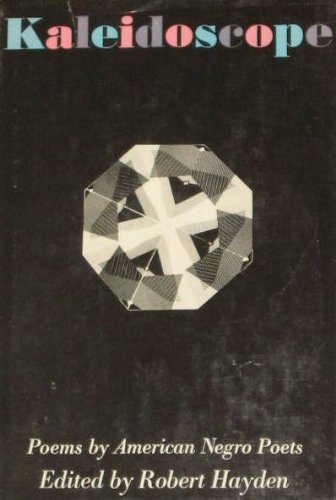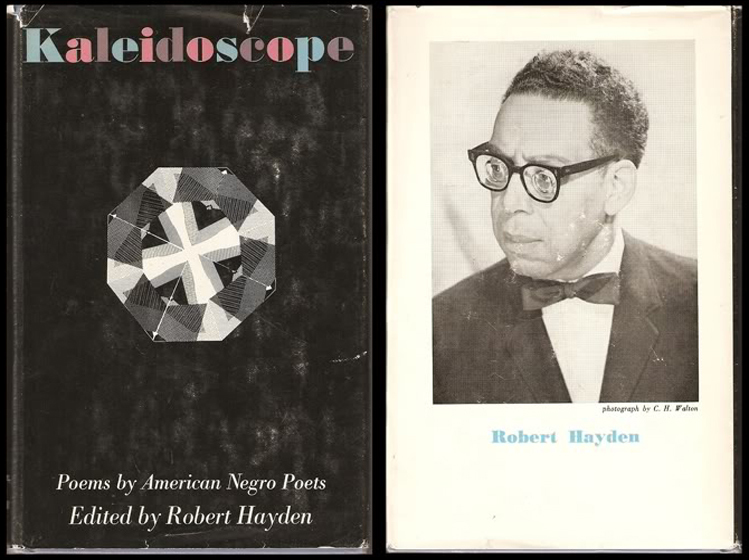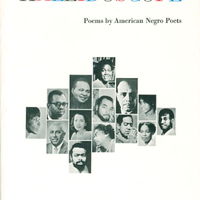-
Title
-
Kaleidoscope: Poems by American Negro Poets
-
This edition
-
"Kaleidoscope: Poems by American Negro Poets" . Ed. Robert Hayden. New York: Harcourt, Brace & World, 1967. xxiv+231 pp.
-
Table of contents
-
Introduction / Phillis Wheatley / from "To the Right Honorable William, Earl of Dartmouth, etc.," -- His Excellency, General Washington -- On Being Brought from Africa to America -- George Moses Horton / George Moses Horton, Myself -- On Liberty and Slavery -- Frances Ellen Watkins Harper / The Slave Auction -- Paul Laurence Dunbar / The Paradox -- Harriet Beecher Stowe -- To a Captious Critic -- The Poet -- The Haunted Oak -- The Debt -- Robert Gould Shaw -- James Weldon Johnson / Saint Peter Relates and Incident of the Resurrection Day -- Anne Spencer / At the Carnival -- Dunbar -- Georgia Douglass Johnson / I Want to Die While You Love Me -- Fenton Johnson / Tired -- The Minister -- The Banjo Player -- Claude McKay / Spring in New Hampshire -- The Tropics in New York -- If We Must Die -- St. Isaac's Church, Petrograd -- Jean Toomer / from "Karintha" -- Reapers -- from "Carma" -- Song of the Son -- Georgia Dusk -- Melvin B. Tolson / African China -- from "Harlem Gallery" -- Frank Horne / To James, from "Letters Found Near a Suicide" -- Kid Stuff -- Sterling A. Brown / Mose -- Strange Legacies -- Revelations -- Sporting Beasley -- Arna Bontemps / Close Your Eyes! -- Southern Mansion -- Reconnaissance -- To a Young Girl Leaving the Hill Country -- A Black Man Talks of Reaping -- Langston Hughes / I, Too -- Jazzonia -- Pennsylvania Station -- Two Somewhat Different Epigrams -- Montmartre -- Desert -- Where?When?Which? -- Late Corner -- Countee Cullen / A Brown Girl Dead -- Tableau -- Saturday's Child -- Wisdom Cometh with the Years -- For a Lady I Know -- For John Keats -- For Paul Laurence Dunbar -- From the Dark Tower -- Frank Marshall Davis / Robert Whitmore -- Arthur Ridgewood, M.D. -- Giles Johnson, Ph.D. -- Robert Hayden / The Diver -- Full Moon -- The Ballad of Sue Ellen Westerfield -- "summertime and the living..." -- Frederick Douglass -- Owen Dodson / Circle one -- When I Am Dead -- Conversation on V -- Hymn Written After Jeremiah Preached to Me in a Dream -- from "The Confession Stone" -- Margaret Danner / I'll Walk the Tightrope -- These Beasts and the Benin Bronze -- Sadie's Playhouse -- Through the Varied Patterned Lace -- Dudley Randall / Booker T. and W.E.B. -- George -- Souvenirs -- Margaret Abigail Walker / For My People -- Lineage -- Molly Means -- Towa Farmer -- Childhood -- Samual Allen / To Satch -- A Moment Please -- Gwendolyn Brooks / Hunchback Girl: She Thinks of Heaven -- Negro Hero -- Piano after War -- Mentors -- But can see better there, and laughing there -- Strong Men, Riding Horses -- The Bean Eaters -- Myron O'Higgins / Vaticide -- M. Carl Holman / Notes for a Movie Script -- Song -- Three Brown Girls Singing -- Mr. Z -- James A. Emmanuel / The Young Ones, Flip Side -- Wedding Procession, from a Window -- The Negro -- Mari Evans / The World I See -- If There Be Sorrow -- ...And the Old Women Gathered -- Naomi Long Madgett / The Reckoning -- Two Poems from "Trinity: A Dream Sequence" -- G.C. Oden / The Carousel -- Review from Staten Island -- "...As When Emotion Too Far Exceeds its Cause" -- A Private Letter to Brazil -- Oliver Pitcher / Salute -- Raison d'Étre -- Ted Joans / Voice in the Crowd -- It is Time -- Calvin C. Hernton / Young Negro Poet -- Madhouse -- Gerald William Barrax / The Sacrifice -- Christmas 1959 et cetera -- Patroness -- The Death of a Squirrel in McKinley Park -- Black Narcissus -- Conrad Kent Rivers / The Invisible Man -- The Still Voice of Harlem -- The Subway -- Leroi Jones / Epistrophe -- Preface to a Twenty Volume Suicide Note -- Snake Eyes -- Audubon, Drafted -- Bob Kaufman / To My Son Parker, Asleep in the Next Room -- Perhaps -- Who Has Seen the Wind? -- Response -- Julia Fields / Madness One Monday Evening -- David Henderson / Sketches of Harlem -- Julius Lester / Poems -- Carl Wendell Hines, Jr. / Two Jazz Poems -- D. L. Graham / soul.
-
Reviews and notices of anthology
-
• Lee, Don L. (Haki Madhubuti). Rev. of "Kaleidoscope", ed. Robert Hayden. "Negro Digest"
"In all likelihood, those very words 'poems by American Negro Poets,' and not the book's title, will sell this anthology. However, in Mr. Hayden's introduction one can't get past the first page without encountering the editor's persistent efforts at apologizing for not only being a 'negro' poet but for writing 'negro' poetry. For those poets who purportedly write poetry directed toward and for the 'negro,' Mr. Hayden says that its aim is 'to give Negroes a sense of human dignity and provide them with "ideological weapons"" (quoted in Melba Joyce Boyd. "Wrestling with the Muse: Dudley Randall and the Broadside Press". New York: Columbia UP, 2003. 155).
-
Commentary on anthology
-
• "An anthology of forty-two black American poets, from Phillis Wheatley to the present, with bio-bibliographical sketches for each" (Rowell 1972: 56).
• Hayden's "Kaleidoscope: Poems by American Negro Poets" (1967) was published "one year after the famed Fisk University Writers Conference, when he had refused to retreat from his position on racial politics and poetry [i.e. rejecting the emergent racially militant aesthetic]. His aesthetic attitude was reflected in the canon of "Kaleidoscope", which demonstrated which poets, including which Black Arts poets, he felt merited notice. Dudley Randall's letter to Hayden about "Kaleidoscope" included praise for the jacket cover, the printing features, the selection of poets, and the insightful introductory essay. But he warned Hayden to anticipate some hostile responses:
By accident I saw an approval copy of "Kaleidoscope" at my library, and of course took it home. It's a beautiful book. I like the black jacket & the sparkling letters of the title, & I like the title too, instead of one of those prosy ones—Poetry of the N—etc. I'd have preferred for the book to be the same color as the jacket, but the pale blue isn't bad, & the gold letters give it sparkle.
The bold type is large & easy to read, & you're generous with white space, allotting a full page to 4-line poems. Mostly, you avoid the anthology war-horses. Refreshingly, Tolson wasn't represented by his 'Chicago Ode.' Two of my poems had never been anthologized before, and, as every anthologist seems to be expected to do, you introduced new voices. I knew of Julius Lester, as he was in my "For Malcolm" bibliography, but I didn't know he was a poet, & I had no inkling that he was black. I'd never heard of Barrax, & I see you corralled Bob Kaufman, Gloria Oden, & Moses Holman, & Jean Toomer.
Your criticism had probing insight. You defined both the strengths & weaknesses of poets in a brief compass. In that it was like Johnson's anthology, while it was like "Caroling Dusk" in being a poet's choice & a poet's title.
It's not too weighty with scholarly appendages—indexes of poets, titles. School kids will like it, & the price, $3.95, is surprisingly low. Your stand on Negro poetry might earn you some blows—it'll be interesting to read the reviews. Fuller said its appearance was awaited with interest. Some new Black poets are out—Knight, Neal, Hamilton, Fabio, Snellings, but it's not intended to be all-inclusive. In all, an excellent bk. & thanks for including me. I'm proud to be in it. //
You're established as anthologist now, along with Johnson, Cullen, Bontemps & Hughes. Thanks for the mention of Broadside. Perhaps I'll get some orders from that. I was thinking of giving them up. Wish you'd mentioned "For Malcolm" & "Poem Counterpoem", as that might have brought in orders. See what being a publisher has doe to me? Changed me from a poet to a businessman. Ugh! My best to Erma & Maia.
"In the introduction to "Kaleidoscope", Hayden ridicules his opposition by referring to them as 'poets of the "Negro" revolution' (emphasis added), which was considered an affront during the semantic debate over 'Negro' and 'Black':
Those who presently avow themselves 'poets of the Negro revolution' argue that they do indeed constitute a separate group or school, since the purpose of their writing is to give Negroes a sense of human dignity and provide them with ideological weapons. A belligenrent race pride moves these celebrants of Black Power to declare themselves not simply 'poets,' but 'Negro Poets.' However, Countee Cullen, the brilliant lyricist of the Harlem Renaissance in the 1920's, insisted that he be considered a 'poet,' not a 'Negro poet,' for he did not want to be restricted to racial themes nor have his poetry judged solely on the basis of its relevance to the Negro struggle.
"Hayden's vocabulary and stance instigated an antagonistic response from Don L. Lee, whose review of the anthology in the "Negro Digest" provided an opportunity to showcase his polemicsby attacking Hayden's critique of Black Arts. . . . // the inclusion and exception given to the poetry of Melvin B. Tolson and LeRoi Jones demonstrates that Hayden's editorial decisions were not solely based on philosophical differences. However, Don L. Lee's confrontational critique of "Kaleidoscope" contributed to the ongoing tension; meanwhile, Hayden's national literary prominence thrived and even rivaled that of Jones. In 1969, Hayden was invited to be the poet-in-residence at the Library of Congress and assumed a professorship at the University of Michigan" (Melba Joyce Boyd. "Wrestling with the Muse: Dudley Randall and the Broadside Press". New York: Columbia UP, 2003. 154-56).
-
Cited in
-
• Kinnamon 1997: 470.
• Indexed in "The Columbia Granger's Index to African-American Poetry" (1999)
-
Item Number
-
A0077





